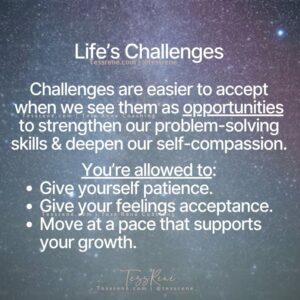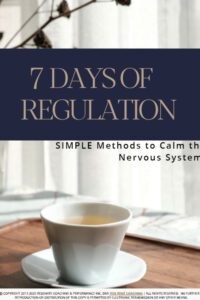Fear of Abandonment Series: PART 2
Begin with Part One: Why You’re Afraid You’ll Be Left Alone, where we introduce the roots of abandonment fear & why it feels overwhelming. Then dive in here to discover how your nervous system responds & what that means for your healing.
Table of Contents
Fear of Abandonment Nervous System Responses

When your body feels on guard all the time, even small moments can feel too much..
The responses from a wound of abandonment aren’t just floating in your head. They’re real, body‑level signals that can leave you bracing for a storm that never ends.
Whether it’s a racing heartbeat when a text goes unanswered or the knot in your stomach when plans suddenly shift, your body often reacts faster than your mind.
The good news? These patterns aren’t proof that you’re broken; they’re the way your nervous system learned to keep you safe. With gentle practice, those lessons can be reprogrammed.
Think of it like finally learning the secret language your body has been speaking all along.
🌿In this Part Two of the Fear of Abandonment series, we go beyond understanding what happens neurologically and dive into why it matters and how your system can heal.
What Happens in Your Nervous System

When your body feels overwhelmed, calm moments of stillness help your nervous system remember it’s safe.
“It’s not “all in your head” it’s in your whole body. While that might sound dramatic or even discouraging, it’s actually good news.”
Once you understand what’s happening in your body, you can stop seeing it’s response to the wound of abandonment as scary or and start seeing your nervous system as a friend (→ explore how the mind and body are deeply connected in healing work).
Think of it as shining a gentle light into a room that always felt a bit too dark.
Once the lights are on, you can finally see what’s been making all that noise in the shadows. Picture your nervous system like a loyal guard dog that sometimes overreacts to shadows. When it senses distance, silence, or rejection, it sounds the alarm. Here’s how those signals show up behind the scenes:
-
Primitive survival logic kicks in. Unlike a physical threat, the nervous system treats abandonment as a survival threat where connection literally matters. Instead of “fight, flight, freeze,” the primary impulse becomes seek contact or call out for closeness even if maladaptively. This pattern begins in early attachment, failure to meet emotional needs.
-
Attachment wiring shapes reaction. Inconsistent caregiving creates an anxious attachment style. You’ve learned that the only path to safety is vigilance and proximity even if these strategies backfire.
EXPLORE MORE HERE → For support on accepting reality and feeling regulated without denying your emotions
How The Wound of Abandonment Shows Up in Daily Life

Challenges are often reminders to meet your own needs with patience and self-compassion.
“If your nervous system had a diary, it would probably be filled with moments of hyper‑vigilance and little sticky notes saying: “Look out! or “Don’t get left behind!”
Or…seen through the eyes of your guard dog, life can start to feel like walking through a neighbourhood of false alarms where neutral events feel like world-ending shake ups.
In relationships, the same ordinary moments can spark survival-level reactions. From the racing heartbeat from an unanswered text to the knot in your stomach when plans shift, your body often reacts faster than your mind. Here’s how those false alarms can play out in everyday life.
These everyday behaviours might look small, but together they paint a powerful picture of how fear of abandonment shapes your life:
Common patterns wound of abandonment symptoms include:
-
Clinginess or constant reassurance‑seeking (“Are you mad at me?”)
-
Self‑worth contingent on others’ behaviour (“If they cancel dinner, I must be unlovable”)
-
Pushing others away proactively to avoid hurt
-
People‑pleasing at the cost of self, in a bid to remain safe
-
Hyper‑analyzing every interaction, hunting for signs of hidden rejection
These patterns deepen the nervous system response. The more you act from fear, the more strongly those survival patterns reinforce.
The good news? This is not you, it’s a pattern. All patterns can be changed…
Why You Repeat These Patterns

Old patterns often grow quietly beneath the surface until awareness begins to bring them into the light.
“You aren’t broken. You’re running an old survival playlist on repeat that needs updating.”
Ever wonder why even if you “know better,” the cycle of hypervigilance keeps looping? That’s an old survival playlist on repeat that needs updating.
Imagine your guard dog has memorised every shadow it’s ever barked at and now it growls the moment those shapes appear, even if nothing dangerous is there.
That’s what your nervous system does with abandonment fear. It keeps a mental scrapbook of every time you felt left, ignored, or unseen, and it replays those memories like warning sirens.
Let’s look at why the patterns from a wound of abandonment sticks around and why it can feel so hard to change:
-
Limbic memory is powerful. Experiences of emotional abandonment create deep neural grooves in the survival parts of your brain like a “warning system” that interprets distance or silence as danger.
- The memories aren’t literal. You won’t hear them replay word for word in your conscious mind. But even if the details are out of reach, your body still remembers. The memory shows up not in words, but in stress reactions, sensations, emotions, and patterns, quietly programming your perceptions beneath your awareness.
-
You protect the inner child. Avoiding closeness, seeking perfection, or people‑pleasing are survival strategies attempted by the inner child who once felt helpless and alone.
-
These strategies become self‑fulfilling. Your fear‑driven behaviors may unintentionally push others away thus confirming your early imprint that closeness equals risk.
Fortunately, change is in your hands. Reparenting the inner child is one way to meet the nervous system where the original wound began and heal these patterned responses.
Healing Begins in the Body: Regulating Your Nervous System

Soothe your nervous system with this free 7-day guide with simple daily practices to help you feel calmer and more in control.
The good news is that even the jumpiest guard dog can be retrained. With patience, steady signals, and kindness, your nervous system learns that not every shadow is a threat.
These practices don’t erase fear overnight, but they do teach your body a new rhythm of safety and trust. They teach your mind that accepting what you don’t control, can be safe.
Here’s how you can start calming the alarms:
-
Recognize reactivity in the body. Racing heart, tight throat, agitation—these are not personality quirks. They’re your body signaling threat. Naming them brings space.
-
Engage regulation tools. Deep breathing (e.g. 4‑count inhale, 8‑count exhale), grounding—(e.g. walking, shaking) disrupts activation and brings you back to parasympathetic “rest‑and‑digest.”
-
Self‑soothing inner child work. Imagine connecting to your younger self in moments of early abandonment and ask, “What do you need right now?” Then, offer it. Over time, new neural pathways form.
-
Get support that proves safety. Relationships with people who are steady, emotionally available, and respectful help retrain your system that connection can be safe. Friendships, therapy, or community all serve this purpose.
- Daily Rituals. Calming regular practices like 5 minutes of yoga in the morning, create a routine and sense of predictability for the mind and body that, over time, makes calm an easier state to tap into.
Practical Steps: From Awareness to Integration

Grounding, breath, and gentle self-contact help your body feel safe enough to build new responses.
Think of this part as giving your guard dog some clear, gentle training, not punishment, to create new ways to respond. Instead of reacting to every creak & shadow, you’re showing it how to pause, sniff the air, and settle back down.
The simple steps below will help to build trust between you and your nervous system & signal safety one moment at a time.
Healing the Wound of Abandonment Through Gentle Nervous System Training:
| Step | Practice |
|---|---|
| Notice the trigger | When you feel insecure or anxious, pause and label: “My body feels tight; I’m craving reassurance.” |
| Regulate physically | Practice slow breath, grounding, shaking, or movement to release the charge. |
| Ask your inner child | What age and feeling are triggered? What would help that child feel safe now? |
| Provide that comfort | Offer compassion and presence—through journaling, self-talk, or imagine hugging that younger you. |
| Seek safe connection | Lean into someone trustworthy just long enough to say: “Can you stay with me while I feel this?” |
| Repeat frequent small rewiring | Regular practice weakens old patterns and builds new neural pathways. |
Healing Your Wound of Abandonment

“This woman’s powerful questions helped me find the clarity I needed.” — C Schiemer
Healing fear of abandonment isn’t about shutting down the alarms or silencing your body’s signals. It’s about learning to walk into once‑dark rooms knowing you can find the light switch to see what’s really there.
The protector inside you that barks at shadows on the walls & creaks in the floorboards was never trying to hurt you. With compassion, practice, and steady support, you can reassure it that not every pause or silence is a threat.
Over time, the room feels brighter, the shadows less frightening, and your inner protector less jumpy. And that’s when something shifts: you realise you’re not bracing for abandonment anymore. You’re living in the light, with a nervous system that trusts you to keep it safe.
That’s when we move beyond change and into transformation and in Part Three, we’ll explore the practical steps that help you turn nervous‑system safety into lasting freedom…
What’s Ahead: Moving the Wound Of Abandonment into Transformation
In Part Three of the Fear of Abandonment series, we’ll explore what it really means to move past coping and into lasting transformation. You’ll discover how to build the kind of safety, trust, and resilience that doesn’t just quiet the alarms; it rewires your nervous system so you can live with more ease, connection, and freedom.
When Healing Feels Out of Reach — It Isn’t.
When your body keeps bracing for loss, change starts with safety.
If you want calm, steady support while you retrain your nervous system, I’m here to help you practise the tools and make them real in daily life. In a private consult, we’ll uncover body-based tools for lasting change. Here’s how one client described it:
“Tess has a gift for guiding you into safety even when your whole body feels on edge.” – Melynda F.
